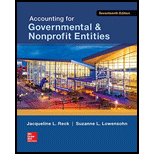
Accounting for Governmental & Nonprofit Entities
17th Edition
ISBN: 9780078025822
Author: Jacqueline L. Reck James E. Rooks Distinguished Professor, Suzanne Lowensohn, Earl R Wilson
Publisher: McGraw-Hill Education
expand_more
expand_more
format_list_bulleted
Concept explainers
Textbook Question
Chapter 2, Problem 15.8EP
Under the modified accrual basis of accounting
- a. Revenues are recognized at the time an exchange transaction occurs.
- b. Expenditures are recognized as the cost of an asset expires or is used up in providing government services.
- c. Revenues are recognized when current financial resources become measurable and available to pay current-period obligations.
- d. Expenses are recognized when an obligation occurs for costs incurred in providing services.
Expert Solution & Answer
Want to see the full answer?
Check out a sample textbook solution
Students have asked these similar questions
Sales in Northway Inc. increased from $45,000 per year to $48,600 per year while net operating income increased from $12,000 to $15,600. Given this data, the company's degree of operating leverage must have been: a) 2.56 b) 3.08 c) 3.75 d) 5.05 help me with this
Fixed order quantity model?
Provide answer with calculation
Chapter 2 Solutions
Accounting for Governmental & Nonprofit Entities
Ch. 2 - Prob. 1QCh. 2 - Prob. 2QCh. 2 - Explain the modified accrual basis of accounting....Ch. 2 - Prob. 4QCh. 2 - What is the primary reason government entities use...Ch. 2 - What is meant by the terms deferred outflows of...Ch. 2 - How do expenses and expenditures differ?Ch. 2 - Prob. 8QCh. 2 - Prob. 9QCh. 2 - Prob. 10Q
Ch. 2 - Prob. 11CCh. 2 - Prob. 12CCh. 2 - Prob. 15.1EPCh. 2 - Prob. 15.2EPCh. 2 - Prob. 15.3EPCh. 2 - The measurement focus and basis of accounting that...Ch. 2 - Which of the following amounts that are identified...Ch. 2 - Prob. 15.6EPCh. 2 - Prob. 15.7EPCh. 2 - Under the modified accrual basis of accounting a....Ch. 2 - Prob. 15.9EPCh. 2 - A certain city reports the following year-end...Ch. 2 - Prob. 16EPCh. 2 - Prob. 17EPCh. 2 - Prob. 18EPCh. 2 - Fund Balance Classifications. Section A provides a...Ch. 2 - Prob. 20EP
Knowledge Booster
Learn more about
Need a deep-dive on the concept behind this application? Look no further. Learn more about this topic, accounting and related others by exploring similar questions and additional content below.Similar questions
- Sales in Northway Inc. increased from $45,000 per year to $48,600 per year while net operating income increased from $12,000 to $15,600. Given this data, the company's degree of operating leverage must have been: a) 2.56 b) 3.08 c) 3.75 d) 5.05arrow_forwardOffice Haven is an office supply store. Office Haven's revenue in the current year is $950 million, and its cost of goods sold is $720 million. Compute Office Haven's gross profit and its gross profit percentage.need answerarrow_forwardCalculate the debt to equity ratio general accountingarrow_forward
arrow_back_ios
SEE MORE QUESTIONS
arrow_forward_ios
Recommended textbooks for you
- Principles of Accounting Volume 1AccountingISBN:9781947172685Author:OpenStaxPublisher:OpenStax College
 Financial Reporting, Financial Statement Analysis...FinanceISBN:9781285190907Author:James M. Wahlen, Stephen P. Baginski, Mark BradshawPublisher:Cengage Learning
Financial Reporting, Financial Statement Analysis...FinanceISBN:9781285190907Author:James M. Wahlen, Stephen P. Baginski, Mark BradshawPublisher:Cengage Learning Intermediate Accounting: Reporting And AnalysisAccountingISBN:9781337788281Author:James M. Wahlen, Jefferson P. Jones, Donald PagachPublisher:Cengage Learning
Intermediate Accounting: Reporting And AnalysisAccountingISBN:9781337788281Author:James M. Wahlen, Jefferson P. Jones, Donald PagachPublisher:Cengage Learning - Century 21 Accounting Multicolumn JournalAccountingISBN:9781337679503Author:GilbertsonPublisher:Cengage
 College Accounting, Chapters 1-27AccountingISBN:9781337794756Author:HEINTZ, James A.Publisher:Cengage Learning,
College Accounting, Chapters 1-27AccountingISBN:9781337794756Author:HEINTZ, James A.Publisher:Cengage Learning,

Principles of Accounting Volume 1
Accounting
ISBN:9781947172685
Author:OpenStax
Publisher:OpenStax College

Financial Reporting, Financial Statement Analysis...
Finance
ISBN:9781285190907
Author:James M. Wahlen, Stephen P. Baginski, Mark Bradshaw
Publisher:Cengage Learning

Intermediate Accounting: Reporting And Analysis
Accounting
ISBN:9781337788281
Author:James M. Wahlen, Jefferson P. Jones, Donald Pagach
Publisher:Cengage Learning

Century 21 Accounting Multicolumn Journal
Accounting
ISBN:9781337679503
Author:Gilbertson
Publisher:Cengage


College Accounting, Chapters 1-27
Accounting
ISBN:9781337794756
Author:HEINTZ, James A.
Publisher:Cengage Learning,
The KEY to Understanding Financial Statements; Author: Accounting Stuff;https://www.youtube.com/watch?v=_F6a0ddbjtI;License: Standard Youtube License